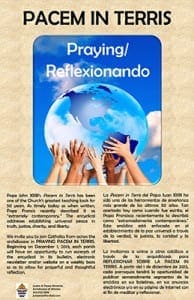Atlanta
‘Peace encyclical’ offered in print, online weekly briefs
By NICHOLE GOLDEN, Staff Writer | Published November 21, 2013
ATLANTA—A landmark document on peace is being offered in a new format to touch more people.
“Pacem in Terris,” the final encyclical of Blessed Pope John XXIII, was addressed not only to the Catholic faithful but also to “all men of good will” when it was written in 1963. The English title is “Peace on Earth.”
On Sunday, Dec. 1, an 18-month observance of the 50th anniversary of the encyclical will begin called “Praying Pacem in Terris.”
The Justice and Peace Ministries of the Archdiocese of Atlanta is organizing this locally.
Leslye Colvin, program specialist, said the full text has been segmented into weekly excerpts in English and Spanish. Each week the excerpt will be available for parishes to use in their bulletins, on their websites or television monitors, or on fliers and posters.
“We believe that God’s Spirit will bear fruit within this local church—as individuals and as community—as Catholics across north Georgia pray and reflect upon this important teaching tool with open hearts,” wrote Colvin in a letter to parish representatives.
 The weekly excerpts will also be posted on the archdiocesan website (www.archatl.com) or you can receive an email version by sending an email with “Praying Pacem in Terris” in the subject line to JustPeace@archatl.com.
The weekly excerpts will also be posted on the archdiocesan website (www.archatl.com) or you can receive an email version by sending an email with “Praying Pacem in Terris” in the subject line to JustPeace@archatl.com.
Pope Francis spoke about the anniversary of “Pacem in Terris” in October to participants on the Pontifical Council for Justice and Peace. The pope said the world “continues to be in need of peace and the call of ‘Pacem in Terris’ continues to be extremely timely.”
Pope John XXIII had lived through both World Wars and wrote the encyclical during the height of the Cold War. Its message was on establishing universal peace in truth, justice, charity and liberty. His episcopal motto as pope was “Oboedientia et Pax,” Latin for “Obedience and Peace.” He issued the encyclical in April 1963, just two months before his death from cancer.
In the encyclical the pope encouraged all to pray for peace and to work for it. The Holy Father addressed the “immense task” of establishing new relationships in human society between individual citizens, between citizens and their states, and between individuals, families, states and the world community — all under the guidance of truth, justice, charity and freedom.
The pope also spoke of the hope that many more people, Christians especially, would join those currently working to bring about true peace.
“Everyone who has joined the ranks of Christ must be a glowing point of light in the world, a nucleus of love, a leaven of the whole mass. He will be so in proportion to his degree of spiritual union with God,” proclaimed the pope. “The world will never be the dwelling place of peace, till peace has found a home in the heart of each and every man, till every man preserves in himself the order ordained by God to be preserved.”
In the encyclical, Pope John draws upon the question of St. Augustine to illustrate this divine order: “Does your mind desire the strength to gain the mastery over your passions? Let it submit to a greater power, and it will conquer all beneath it. And peace will be in you—true, sure, most ordered peace. What is that order? God as ruler of the mind; the mind as ruler of the body. Nothing could be more orderly.”
The encyclical, issued during Holy Week of 1963, concluded with the pope asking all to pray with “fervor” for peace and for the Redeemer to banish all that might endanger peace in the souls of men.
“May He transform all men into witnesses of truth, justice and brotherly love. May He illumine with His light the minds of rulers, so that, besides caring for the proper material welfare of their peoples, they may also guarantee them the fairest gift of peace,” wrote the pope. “Finally, may Christ inflame the desires of all men to break through the barriers which divide them, to strengthen the bonds of mutual love, to learn to understand one another, and to pardon those who have done them wrong.”